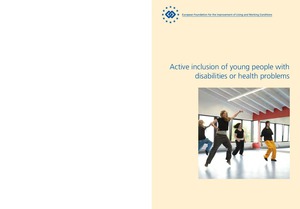Active inclusion of young people with disabilities or health problems
"Eurofound made a review of existing incapacity benefits aimed at young people of working age in the EU Member States, including data on the take-up of benefits. What is worrying is a relatively new trend indicating a significant increase in their take up among young people – in the Netherlands...
| Main Authors: | , , , , , |
|---|---|
| Institution: | ETUI-European Trade Union Institute |
| Format: | TEXT |
| Language: | English |
| Published: |
Luxembourg
2012
Office for Official Publications of the European Communities |
| Subjects: | |
| Online Access: | https://www.labourline.org/KENTIKA-19108788124919269609-active-inclusion-of-young-peop.htm |
| Summary: | "Eurofound made a review of existing incapacity benefits aimed at young people of working age in the EU Member States, including data on the take-up of benefits. What is worrying is a relatively new trend indicating a significant increase in their take up among young people – in the Netherlands, Denmark and Finland. The research shows that the reason for the increase has been predominantly various mental health problems. Research also indicates that debt is a much stronger risk factor for mental disorder than low income. additionally, current employment patterns with long hours and more intense work are not conducive for people with health problems. There is also an issue of special education as it seems that in many countries people with health problems move directly from special education into incapacity schemes. To identify effective strategies to tackle this trend, there is clear need to understand the reasons.
This is the focus of Eurofound research which is paying particular attention to activation measures in health, social and employment services. The research also looks at the role of incapacity benefits agencies, education systems, employers and trade unions. Phase I of the study was carried out in six Member States: Denmark, Finland, The Netherlands, Poland, Spain, and the United Kingdom. Phase II research has been completed in five further countries: France, Germany, Ireland, Portugal and Slovakia." |
|---|---|
| Physical Description: | VII, 119 p. Paper Digital |

